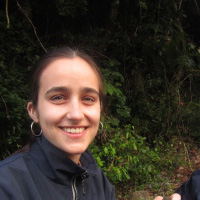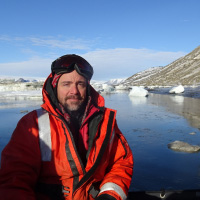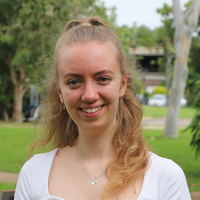Fast Facts
Location
Commencing
- Townsville: February, July
- Cairns: February, July
Fees
$40,360.00+
+estimated annual tuition fee for a full-time study load
Plus Student Services and Amenities fee
Scholarships and financial aid available if eligible
Duration
3 years full-time
Entry Requirements
Mathematical Methods (Units 3/4,C)
Recommended Knowledge
English (Units 3/4,C), Chemistry (Units 3/4,C)
English language requirements
Band 1
If your native language is not English, you must meet the minimum English language requirements for this course.
View the international entry requirements for this course
CRICOS Code
092515M
Course detail
Develop your passion for discovery and choose from nine different majors. You will also choose from a set of core advanced skill subjects to develop analytical and modelling skills that are highly sought-after by future employers.
Apply your skills and knowledge to real-world research projects and have the opportunity to be published in international scientific journals. Go on overseas exchange programs and study natural environments in other parts of the world. Use your degree as a pathway to other health professions or higher research.
Students who are based in Townsville and have completed at least one year of their degree are eligible to apply for an Australian Public Service Academy Campus position. With opportunities in the Digital and Data spheres, you can align your studies to part-time work, that may translate into a full-time job offer upon graduation. Explore the APS Data and Digital Programs page for more information.
Become a science and research leader. JCU Advanced Science graduates are elite, innovative professionals who are equipped for the future.
Additional information
JCU's Bachelor of Advanced Science
Are you ready to join an elite team passionate about becoming the next generation of scientific leaders? Do you have what it takes to meet the environmental and scientific challenges of the 21st century and find innovative and effective solutions? If this sounds like you, the Bachelor of Advanced Science at James Cook University could be your path to excellence.
Be in high demand with your advanced skills and practical, hands-on experience with JCU’s advanced science degree. You will be leading the way in addressing modern society’s most pressing scientific needs.
A Comprehensive Background
Become an elite, innovative professional with a world-class education that develops highly adept conceptual and analytical thinkers. Your advanced science degree from JCU gives you a firmer grasp on what you know, challenges your thinking, inspires your creativity, and provides a wealth of hands-on experience.
Develop a broad perspective and participate in seminars conducted by leading scientists. Study advanced subjects to gain specialised skills in quantitative methods and mathematical techniques. Engage in research that matters; research designed for publication in some of the most prestigious international scientific journals.
Experience has no substitute. Study in some of the most interesting places on Earth participating in hands-on experiments. Explore unrivalled research locations as you put theory into practice. Access World Heritage natural environments and state-of-the-art learning facilities.
Expand your scientific knowledge with international academic exchange programs. Develop personally, as you learn from other cultures’ scientific perspectives and diverse landscapes and professionally, as you build global networks. Be exposed to other natural ecosystems and have the opportunity to make your own contribution.
Gain real-world skills that set you apart for a distinguished career. You will learn how to collaborate with colleagues making significant scientific progress, articulate questions and arguments in constructive ways, and critically appraise your work and the role of science.
A Personal Perspective
What sets you apart, what motivates and inspires you? As you work towards your Bachelor of Advanced Science, thrive off the inspiration that comes from studying your passion.
Choose the major that appeals most to you, and prepare yourself for the places you want your career to take you. Work in data science, earth science, marine biology, aquaculture science and technology, chemistry, physics, mathematics, molecular and cell biology, or zoology and ecology.
Your advanced science degree also offers you the option of choosing between a second major or a minor with classes in advanced scientific fields. Choose a second major to complement your first. Choose a minor that opens up new possibilities.
An Advanced Science Degree for the Forward Thinking
Take the first step towards a career that makes a difference to people and societies, the natural world and the built environment with an advanced science degree. Be prepared for tomorrow’s challenges with JCU’s world-class education.
Gain the Bachelor of Advanced Science Honours degree with an additional year of study. This is your capstone year as you develop a research project from start to finish.
Work with the world’s oceans and help to conserve precious marine life in marine biology, or set the tone for society’s interactions with the natural world with an emphasis in zoology and ecology. Help discover new and innovative ways of preserving natural resources while protecting vulnerable people as you work in earth science or chemistry.
Whatever field you choose, your greatest contribution to the natural world and people and societies will be the highly transferable skills you develop. With an agile mind, critical thinking skills, and an interdisciplinary outlook, be poised to lead in the fast-paced scientific world.
Ready Today for Tomorrow with Your Advanced Science Degree
Build on your intellectual capabilities, ethical convictions, and professional passion with a Bachelor of Advanced Science degree.
Develop a solid foundation of technical knowledge to advance your skills and the analytical thinking to apply that knowledge and think outside the box to solve important questions.
Systematically collect data and design testable hypotheses based on your findings. You will know how to draw the right inferences from what you see.
Understand the ethics that have governed scientific advancement for centuries and why they are important in the context of modern-day science. Differentiate yourself with your ability to work effectively, but also responsibly and safely and with consideration for cultural frameworks.
Differentiate Yourself With JCU's Bachelor of Advanced Science
The world needs scientists that are ready and willing to meet the problems of designing a sustainable future. Step up to meet the challenge with us and graduate with an advanced science degree from JCU.
Hide additional information
View the Handbook for a detailed overview of available subjects.
Inherent requirements
Inherent requirements are the identified abilities, attributes, skills, and behaviours that must be demonstrated, during the learning experience, to successfully complete a course. These abilities, attributes, skills, and behaviours preserve the academic integrity of the University’s learning, assessment, and accreditation processes, and where applicable, meet the standards of a profession. For more information please review the inherent requirements for the course.
Majors
You can choose from nine different Science majors.
Aquaculture Science and Technology
Benefit from access to the Marine and Aquaculture Research Facility for the hands-on discovery of the sustainable practices of aquaculture.
Students explore the scientific and practical applications of breeding, rearing and harvesting of plants and animals in all types of water environments. JCU graduates have a deep understanding of the biodiversity of species, the design of aquaculture systems and the basics of nutrition.
Chemistry
With award-winning laboratories at the JCU Science Place and access to industry leaders, students benefit from small class sizes and the personalised approach of lecturers.
A JCU Chemistry major provides skills in analytical chemistry, synthetic, organic and inorganic chemistry, and kinetics and mechanisms of chemical reactions.
Data Science
Experience the power of data visualisation, Big Data and machine learning. Learn how to develop sophisticated algorithms and create innovative solutions to contemporary problems.
Mastermind database systems, programs, models and projects. Learn from experts in the field and become part of the exponentially growing field of Data Science. Be at the forefront of the Data Science revolution with a Data Science major.
Earth Science
With access to state-of-the-art facilities like JCU Fletcherview Field Station, JCU students gain practical skills studying and assessing the unique biodiverse region of North Queensland.
Build your understanding of the effect of humans on the natural environment and build skills to develop solutions to lessen the impact. Graduates have a thorough understanding of how to develop cost-effective and innovative techniques for environmental management.
Marine Biology
Benefit from access to one of the most diverse and fragile marine ecosystems in the world, the Great Barrier Reef. With opportunities to do hands-on research at world-class JCU Orpheus Island Field Station, you will learn from expert lecturers and benefit from researchers’ strong links with industry.
Be equipped to address critical challenges facing marine and coastal ecosystems. Graduates deeply understand humans’ impact on the marine environment and how the oceans and atmosphere interact.
Mathematics
Develop highly sought after problem-solving, analytical and quantitative reasoning skills. You will gain a thorough understanding of various mathematical techniques, data analysis, and multivariate statistical methods.
JCU graduates have the skills to formulate mathematical models, illustrate science and engineering problems and use various techniques to help find solutions.
Advanced Molecular and Cell Biology
Gain hands-on experience using cutting-edge equipment and techniques. Develop an in-depth understanding of molecular genetics. Learn how to amplify and edit DNA sequences and conduct laboratory-based and field-based projects.
JCU students study the basis of health and disease at a molecular level and analyse the functions of a whole cell. Graduates have the advanced knowledge and skills needed to work towards developments within modern medicine and biotechnology.
Explore Molecular and Cell Biology
Physics
Develop the expertise to explore some of the universe’s most challenging questions. Accredited by the Australian Institute of Physics, a Physics major at JCU provides you with knowledge and skills across multiple physics disciplines.
Students learn the fundamentals of energy, quantum mechanics, relativity, antimatter, weather, and climate. The ability to think critically and be experimental is built by exploring biophysics, molecular electronics, and organic solar cells. You will study the structure of matter, atomic and nuclear physics, quantum physics, oceanography and meteorology, and thermodynamics.
Zoology and Ecology
Study amazing rainforests and diverse species. Go on field trips to Borneo or the Galapagos Islands. Access the JCU Daintree Rainforest Observatory to learn about biosecurity, behavioural ecology, conservation biology and ecological modelling. Perform research in one of the most biodiverse regions in Australia.
JCU students learn from world experts, studying the science of the biology of plants and animals and the natural world that they live in.
Honours
An Honours degree is an additional one-year study program (full-time or equivalent) that includes the development of a personal research project and thesis. The three-year Bachelor of Advanced Science is ideal preparation for the rigours of an Honours year, and Advanced Science students are encouraged to consider this option. Honours is especially recommended for students who wish to pursue a career with significant involvement in scientific research. An Honours degree is usually essential for entry to research higher degrees.
JCU Advanced Science graduates are highly-skilled professionals who find employment in a variety of industries.
Graduates pursue careers in areas including marine biology, aquaculture, earth science, chemistry, mathematics, molecular and cell biology, physics, and zoology and ecology.
You could find employment as a research assistant, laboratory technician, scientific journalist, environmental scientist, physicist, teacher, or patent lawyer. Or you could continue onto further studies with the Bachelor of Advanced Science (Honours).
Advanced Science graduates may also choose to apply for graduate entry into science, medicine, veterinary science, physiotherapy, dentistry, or other health sciences.
Graduates who major in Chemistry may be eligible to register for non-corporate membership of the Royal Australian Chemical Institute (RACI). With an additional three years of Chemistry experience, you may be eligible to register as a Chartered Chemist with Corporate Membership of RACI.
Handbook year | Information valid for students commencing in 2024 |
Course code | 115510 |
Course type | BAC – Bachelor Pass (AQF level 7) |
Professional accreditation status | The Physics major for the Bachelor of Advanced Science is accredited by the Australian Institute of Physics (AIP). Graduates are automatically eligible for membership of the Australian Institute of Physics. The Chemistry major for this course is accredited with the Royal Australian Chemical Institute (RACI). Graduates will be eligible for non-corporate membership of RACI and, with an additional three years’ experience in chemistry, may be eligible to register as a Chartered Chemist with Corporate Membership of RACI. |
Owner | Academy |
College | Science and Engineering |
Award Requirements
Admission Requirements
Course Pre-requisites | Mathematical Methods (Units 3/4,C) Recommended Knowledge: English (Units 3/4,C), Chemistry (Units 3/4,C) |
Minimum English language proficiency requirements | Applicants of non-English speaking backgrounds must meet the English language proficiency requirements of Band 1 – Schedule II of the JCU Admissions Policy. |
Special admission requirements | JCU students who have completed the first year of the BSc (including receiving a pass result in SC1109: Modelling Natural Systems-Advanced) and who have a GPA greater than 5.5 (excluding MA1020, CH1020 and PH1001) may apply to transfer to the Bachelor of Advanced Science. |
Academic Requirements for Course Completion
Credit points | 72 credit points as per course structure |
Additional course rules | A maximum of 30 credit points may be taken at level 1. A minimum of 18 credit points of science subjects must be taken at level 3 or higher. |
Course learning outcomes | The graduates of James Cook University are prepared and equipped to create a brighter future for life in the tropics world-wide. JCU graduates are committed to lifelong learning, intellectual development and to the display of exemplary personal, professional and ethical standards. They have a sense of their place in the tropics and are charged with professional, community, and environmental responsibility. JCU graduates appreciate the need to embrace and be acquainted with the Aboriginal and Torres Strait Islander Peoples of Australia. They are committed to reconciliation, diversity and sustainability. They exhibit a willingness to lead and to contribute to the intellectual, environmental, cultural, economic and social challenges of regional, national, and international communities of the tropics. Graduates of the Bachelor of Advanced Science at James Cook University will be able to:
|
Inherent Requirements
Inherent Requirements | Inherent requirements are the identified abilities, attributes, skills, and behaviours that must be demonstrated, during the learning experience, to successfully complete a course. These abilities, attributes, skills, and behaviours preserve the academic integrity of the University's learning, assessment, and accreditation processes, and where applicable, meet the standards of a profession. For more information please visit: Bachelor of Advanced Science. |
Reasonable adjustments | All JCU students have the opportunity to demonstrate, with reasonable adjustments where applicable, the inherent requirements for their course. For more information please visit: Student Disability Policy and Procedure. |
Course Structure
CORE SUBJECTS
Level 1
CH1020:03 Preparatory Chemistry (or any Level 1, 2, 3 or 5 subject if already satisfied via previous study)
MA1000:03 Mathematical Foundations
MA1003:03 Mathematical Techniques
SC1101:03 Science, Technology and Truth
SC1109:03 Modelling Natural Systems-Advanced
Level 2
SC2209:03 Quantitative Methods in Science-Advanced
Level 3
SC3003:03 Science Research Internship or SC3008:03 Professional Placement
PLUS
Select 3 credit points of subjects from List 1 (Advanced Skill Subjects)
PLUS
Select a major from Table A
OPTIONS
Select one of the following Options
Option 1 (Second Major)
Select a second major from Table A
or
Option 2 (Single Major and Electives*)
Select 9 credit points of any Level 2, 3 or 5 Science subjects
PLUS
Select 3 credit points of any Level 3 or Level 5 Science subjects
PLUS
Select 6 credit points of any Level 1, 2, 3 or 5 subjects
PLUS
Select 6 credit points of any Level 2, 3 or 5 subjects
List 1 (Advanced Skill Subjects)
BC5203:03 Advanced Bioinformatics
BS5260:03 Modelling Ecological Dynamics
CH5002:03 Advanced Chemistry Research Project
EA5409:03 Mineralogy and Geophysics
MA2000:03 Mathematics for Scientists and Engineers
PH5014:03 Research Skills and Communication in Physics (Advanced)
SC5502:03 Design and Analyses in Ecological Studies
TABLE A (MAJORS)
Credit points in major | 24 credit points |
MAJOR | AVAILABLE AT | NOTES |
JCU Townsville | Students who undertake this major and a second major of Aquaculture Science and Technology, Marine Biology or Zoology and Ecology will have BS1001 removed from the secondary major structure and replaced with a Level 1 subject elective | |
| Aquaculture Science and Technology | JCU Townsville | The first year of study may be completed in Cairns. Students must then transfer to Townsville. |
JCU Townsville | ||
JCU Cairns JCU Townsville | Students must select CP1401 as one of their undergraduate subject electives. This major is only possible as a second major if students have satisfied CH1020 subject material prior to commencing this course. | |
JCU Cairns JCU Townsville | ||
JCU Townsville | The first year of study may be completed in Cairns. Students must then transfer to Townsville. | |
JCU Townsville | ||
JCU Townsville | Students must select MA2000 as their List 1 elective subject. | |
JCU Cairns JCU Townsville |
Location
COURSE AVAILABLE AT | NOTES |
JCU Cairns | Not all majors are available in Cairns |
JCU Townsville |
Candidature
Expected time to complete | 3 years full-time or part-time equivalent |
Maximum time to complete | 9 years |
Maximum leave of absence | 3 years |
Progression
Course progression | Should successfully complete 18 credit points of level 2 science subjects before attempting any level 5 science subject. |
Course includes mandatory professional placement(s) | No |
Special assessment | Nil |
Professional accreditation | Nil |
Supplementary exam for | Not applicable |
Credit
Eligibility | Students may apply for credit transfer in accordance with the Credit Transfer Procedure |
Maximum allowed | 48 credit points |
Currency | Credit will be granted only for subjects completed in the 10 years prior to the commencement of this course |
Expiry | Credit gained for any subject shall be cancelled 19 years after the date of the examination upon which the credit is based if, by then, the student has not completed this course. |
Other restrictions | A maximum credit of 6 credit points of credit may be granted at level 3. A maximum credit of 12 credit points of credit may be granted for subjects outside the Science Schedule of Subjects. Credit will not be granted for MA1020 or CH1020 or PH1001 |
Award Details
Award title | BACHELOR OF ADVANCED SCIENCE |
Approved abbreviation | BAdvSc |
Inclusion of majors on | Majors will appear on the testamur |
Exit with lesser award | Students who have completed 24 credit points of their course award requirements, and withdraw from or fail to meet the requirements for progression in the later years, may be eligible for the award of Diploma of Tertiary Studies. |
Course articulation | Students who complete this course may be eligible for entry to the Masters of Science. |
Special awards | Students may receive an Award of Recognition in accordance with the Recognition of Academic Excellence Procedure |
Honours
Honours availability | Available as an additional 24 credit points of study [end-on] |
Eligibility | By invitation of the College Dean Normally an overall grade point average of 5.5 is required across the bachelor (pass) degree, with credits or better in the discipline specific areas. Quota restrictions on the number of honours places available may apply from time to time as determined by the College Dean. |
Estimated annual tuition fee: $AUD40,360.00
Courses are charged per year of full-time study. International course fees are reviewed annually and subject to change.
A Student Services and Amenities Fee is payable per subject up to a maximum amount per year.
Student Visa holders must have Overseas Student Health Cover (OSHC) for the duration of their Student Visa (except Norwegian, Swedish and Belgian citizens). Costs depend on the length of study and the number of dependants accompanying the student. For more information see Overseas Student Health Cover (OSHC).
Scholarships and financial aid are also available for international students.
JCU offers multiple Pathways to University. If you do not meet the entry requirements for this Diploma, consider exploring our available Pathways options.
Contact our friendly team today to discover which pathway is right for you.
Application dates vary between courses, whether they're delivered in semester, trimester or carousel study modes. View our Application due dates page for more information.
Gather the documents you need to apply and submit an application via JCU's online application portal.
Real stories
-
Student
Emma Naumann
Bachelor of Advanced Science, majoring in Physics and Mathematics
Being in a small cohort, I have been able to form close, personal bonds with like-minded students. The lecturers and academics have all been exceptionally supportive of my goals. I am excited to be able to continue to apply myself in such a challenging and wonderful field whilst striving towards a career in research.
-
International Student
Mitch Heide
Bachelor of Advanced Science, majoring in Marine Biology
The classes I took have taught me essential skills for both research and industry, and they have broadened my horizons within marine and freshwater biology and ecology. Through JCU, I have experienced the Great Barrier Reef, mangrove forests and tropical beaches. I wouldn't change it for the world.
-

Alumni
Hannah Green
Bachelor of Advanced Science, majoring in Zoology, Ecology and Earth Science
The best part of the degree was the seminars where we met with the coordinator and other professional scientists who showed us a wide range of pathways and careers in industry, government and academia. The cohort was small so their advice and support was very personal which helped me develop confidence and direction.
-

Lecturer
Associate Professor Eric Roberts
Head of Earth and Environmental Science
It is nice to be part of a smaller university where staff and students actually get to know each other, and where there is opportunity to be involved in research. A highlight of our degree is the opportunity for field-based learning, bringing students into the field, and providing real hands-on learning.
-

Employer
Dr. Lyndon Llewellyn
Australian Institute of Marine Science
JCU students are of a like mind to us. They want to make the world a better place and they bring that desire into their work with us. They are practical, passionate and willing to tackle challenging problems through science.

